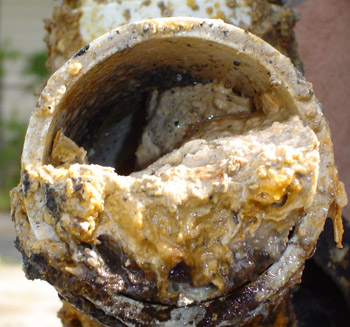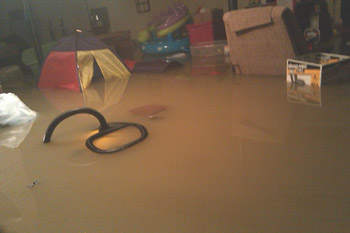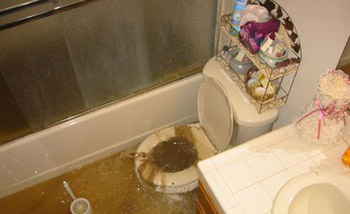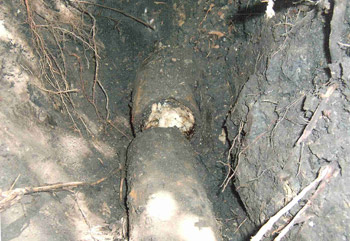F.O.G.(FATS, OILS AND GREASE) & OTHER SEWER ISSUES
PREVENT SEWER BACKUPS AND OVERFLOWS. KEEP GREASE OUT OF YOUR SEWER LINES.
Grease or oil that is poured down sinks, toilets, or other drains can cool and stick to the sides of the sewer lines (both on private property and on public lines). Over time, it can build up and cause the line to be blocked as shown in the pictures below.
When that happens, raw sewage can overflow onto yards, streets, sidewalks, or parking areas and may reach storm drains and discharge to waterways. It also may back up into homes and businesses.
The consequences of backups can be significant:
- Backups can require an expensive cleanup process, especially if it backs up into homes or businesses
- Backups potentially expose people to contact with disease-causing organisms.
- Backups can cause an increase in maintenance costs for sewers, leading to higher sewer bills.
- Backups can lead to temporary, or even permanent, inability to occupy a home or building.
In addition, some insurance companies may not cover, or severely limit coverage for sewer backups.
The sewer service line out to the first cleanout off the main line is the responsibility of the sewer customer, not the PSA. The customer is responsible for any backups on their service line. Also, the customer may also be assessed costs if a main line or upstream user backup occurs due to a sewer customer pouring grease/oil down their line or for an improperly maintained grease trap.
So, how can these problems be avoided? It's simple:
- Never pour grease down sinks, toilets, or other drains. Pour grease in a can or other disposable container and place it in the trash.
- Don’t rely on garbage disposals – they do not reduce grease.
- Don’t relay on hot water or detergents. These only move the grease further down the line to cause problems elsewhere.
- Scrape food scraps and grease into the trash before washing dishes.
- Use baskets or strainers in sink drains to catch food scraps and empty them into the trash.
- If you run a restaurant or other food preparation facility, inspect/clean your grease trap monthly. An improperly maintained grease trap can be a major source of grease in sewer lines. This is frequently a code requirement in localities.
- Mention these steps to friends and neighbors and encourage them to do the same.
By following the steps outlined above, you can help prevent costly and often hazardous sewer backups. This helps keep utility costs down, protects the system from damage, and keeps you from having a mess on your hands!
In addition to FOG, there are other things that can obstruct sewer lines and cause backups. These include, but are not limited to:
- Baby wipes
- Paper towels
- Excessive hair
- Cigarette butts
- Cans
- Corn cobs
- Feminine hygiene products
- Condoms
- Diapers
- Construction debris
These items should always be placed in the trash.
In addition, there are additional items which can cause problems with sewer lines and/or treatment, or cause problems with the environment.
- Prescription and over-the-counter drugs:
This is an area that is coming under scientific study of late. Advances in technology have allowed detection of certain chemical compounds in water at much lower levels. Some of these compounds are detected at parts per trillion or even parts per quadrillion range. To put this in perspective, one part per trillion is like one drop of detergent in enough water to fill a string of railroad cars ten miles long. One part per quadrillion would fill enough cars to go almost halfway around the earth. To most, these seem like levels that are impossible to have any impact. However, research is being conducted on the impact of these compounds on human health (from exposure in drinking water drawn from streams where treated wastewater is discharged upstream) and the impact on aquatic life. In any event, the Authority asks that user refrain from disposing of any medicines in the sewer.
- Adult wipes
Another issue that has arisen is the use of adult wipes. These are marketed as an alternative to toilet paper and are supposed to be flushable. However, studies by a number of public utilities throughout the nation have found them to not break up in sewer lines like toilet paper and therefore cause backups. We ask that consumers who use these wipes place them in the trash.





